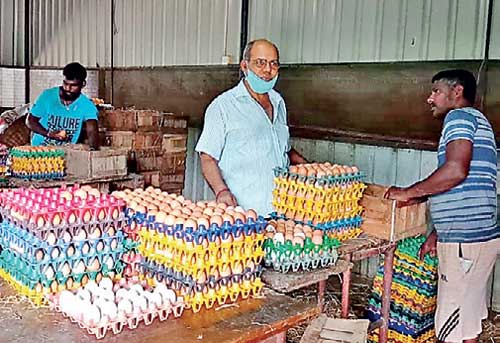Wednesday Feb 18, 2026
Wednesday Feb 18, 2026
Tuesday, 30 August 2022 02:42 - - {{hitsCtrl.values.hits}}
By Charumini de Silva
 The Trade, Commerce, and Food Security Ministry yesterday announced that it will revise the existing Maximum Retail Price (MRP) imposed on eggs, by including the cost of packaging.
The Trade, Commerce, and Food Security Ministry yesterday announced that it will revise the existing Maximum Retail Price (MRP) imposed on eggs, by including the cost of packaging.
As per the Ministry, the eggs sold under the MRP in supermarkets do not include the packaging costs and thus it has been identified as ‘unfair’ for those suppliers. Thereby, the Ministry said separate MRPs will be set for packaged white and brown eggs.
On 19 August, the Consumer Affairs Authority imposed MRP for eggs for the first time in history, despite being categorised as a perishable item. The MRP for a white egg at Rs. 43 and Rs. 45 for a brown/red egg amidst strong industry objection to the move and creating a shortage in the market. The suppliers justified the price hike citing rising cost of production.
The Ministry also said the CAA was assessing necessary guidelines to be considered in packaging costs for the upcoming price revision.
Following several rounds of discussions with top authorities, the All Ceylon Egg Producers Association and the All Island Poultry Farmers Association (AIPFA) agreed to sell eggs at prices ranging Rs. 50 and Rs. 60 each since last Friday.
The understanding between the authorities and the industry was despite a Gazette notice stating stipulated MRPs.
“CAA agreed to provide value-added manufacturers to sell eggs without the MRP,” AIPFA Chairman Ajith Gunasekara told the Daily FT.
The 10-pack supermarket eggs were sold between Rs. 450 to Rs. 700 depending on four different weight categories — small, medium, large and extra-large.
Noting that the packaging was a must to sell eggs in the supermarkets, Gunasekara said the cost of production and risk had increased sharply with the scarcity of animal feed and uncertainty in the market.
As opposed to 15 large-scale suppliers he said 80% of the industry were SMEs. However, with the sudden policy changes, the production cycle has been completely disturbed in the poultry industry.
Around 50% of the SMEs have given up on the industry following multiple crises, which has led to a 40% drop in egg production and a 35% dip in chicken production. The poultry industry has 300,000 people, directly and indirectly, engaged which includes over 200 families.
“The farmers no longer can find or afford animal feed and as a result, the egg production has dropped significantly. This has also resulted in killing animals for meat and farms refraining from breeding animals. These factors have discouraged the stakeholders from engaging in the industry due to high operational risks,” Gunasekara explained.
Pointing out that egg and chicken meat are the cheapest protein sources available given the current economic crisis, he warned the price hike will lead to protein deficiencies, especially among children, and will likely grow as a social issue.
Sri Lanka’s annual average per capita consumption is 118 eggs while the daily production is around seven million. The annual per capita chicken meat consumption is 10 kilos and the production per day is 600 tons.
Despite the multiple challenges, the industry was hopeful that the Government will address the immediate bottlenecks to survive business in the Interim Budget which will be presented to the Parliament today.